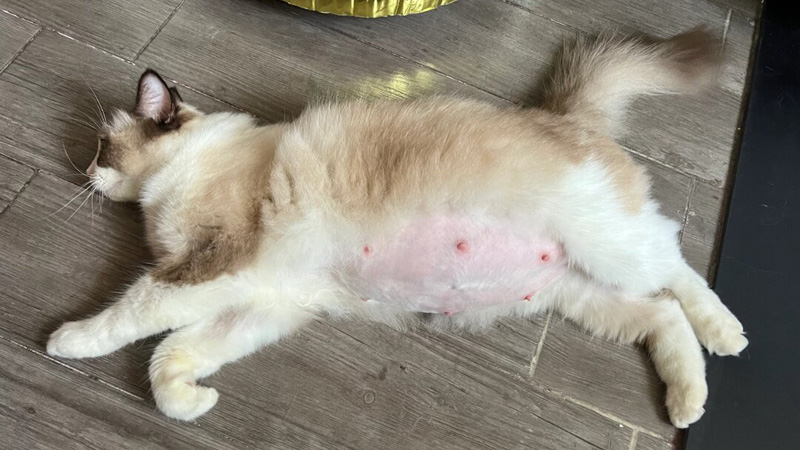How Long Are Cats Pregnant?

The world of feline reproduction is a fascinating and intricate realm, filled with unique processes and timelines that distinguish it from other species. One of the key aspects that captivate cat owners and breeders alike is the duration of a cat's pregnancy. Unlike the extended gestation periods seen in some mammals, feline pregnancies are relatively short-lived, lasting approximately 63 days on average.
In this comprehensive exploration, we delve into the intricacies of feline gestation, the factors influencing its duration, and the significance of this relatively brief yet critical period in a cat's life.
The Average Duration of Feline Pregnancy
When it comes to the length of cat pregnancies, the magic number is 63 days. This period is calculated from the moment of conception to the birth of the kittens. The remarkable brevity of this gestation period sets cats apart from other mammals, particularly humans, where pregnancies endure for a significantly more extended duration.
The 63-day timeline serves as a general guideline, but it's essential to acknowledge that variations can occur. Some cats may deliver a bit earlier or later than the average, leading to pregnancies that span a range of a few days on either side of the typical period.
Factors Influencing the Duration
Several factors contribute to the relatively short gestation period observed in cats. Understanding these elements provides valuable insights into the efficiency and adaptability of feline reproductive processes.
Evolutionary Adaptations:
Cats, by nature, are efficient reproducers. In the wild, a swift gestation period offers a survival advantage, allowing feral cats to reproduce quickly and sustain their populations in challenging environments.
Predatory Lifestyle:
Cats are natural predators, and a shorter gestation period ensures that mothers can return to hunting and securing food for themselves and their offspring promptly.
Litter Size:
The relatively short gestation period in cats is balanced by their ability to produce larger litters. Unlike some mammals that invest a considerable amount of time and resources in a single offspring, cats can give birth to multiple kittens in a single pregnancy.
Maternal Health:
The health of the mother cat also plays a role in the duration of pregnancy. Factors such as the cat's age, overall health, and nutritional status can influence the timing of labor.
The Journey of Feline Pregnancy
Understanding the stages of feline pregnancy provides a deeper appreciation for the physiological and behavioral changes that occur during this brief yet impactful period.
Weeks 1-3: Early Development:
The initial weeks of feline pregnancy involve the fertilized eggs traveling down the fallopian tubes and implanting in the uterus. At this early stage, subtle changes may occur, but external signs are minimal.
Weeks 4-5: Visual Changes:
By the fourth and fifth weeks, distinct physical changes become more evident. Swollen nipples and a slightly enlarged abdomen may become noticeable, offering the first visual cues of pregnancy.
Weeks 6-9: Fetal Growth:
The final stretch of feline pregnancy witnesses significant fetal growth. The mother cat's abdomen becomes more pronounced, and she may exhibit nesting behaviors as she prepares for the impending birth.
Variations in Gestation Periods
While 63 days serves as the average gestation period, variations are not uncommon in the feline world. Some cats may deliver a bit earlier, completing their pregnancies in around 60 days, while others may extend the process slightly, giving birth around the 65-day mark. These variations can be influenced by factors such as genetics, the cat's overall health, and environmental conditions.
Preparing for Birth
As the feline pregnancy nears its culmination, it's crucial for cat owners and breeders to prepare for the birthing process, also known as queening. Providing a quiet and comfortable birthing environment, commonly referred to as a birthing box, can help the mother cat feel secure as she brings her kittens into the world.
Conclusion
The relatively brief duration of a cat's pregnancy encapsulates the efficiency and adaptability ingrained in feline reproductive processes. Understanding the average 63-day gestation period, the factors influencing its duration, and the stages of feline pregnancy enhances our ability to provide attentive care and support during this critical phase in a cat's life.
As cat enthusiasts and responsible pet owners, delving into the intricacies of feline reproduction enriches our connection with these remarkable animals, fostering a deeper appreciation for their unique journey into motherhood.
You May Also Like
 Cat HealthIs Neutering Painful For Cats
Cat HealthIs Neutering Painful For Cats Help & AdviceHow Do I Care For My Cat After Neutering
Help & AdviceHow Do I Care For My Cat After Neutering Help & AdviceHow Do I Know if My Cat Needs to be Neutered?
Help & AdviceHow Do I Know if My Cat Needs to be Neutered? Cat HealthWhat Is The Best Age To Spay Or Neuter A Cat?
Cat HealthWhat Is The Best Age To Spay Or Neuter A Cat? Help & AdviceTo Keep Your Cat Live Longer, These 8 Factors Must Be Paid Attention To
Help & AdviceTo Keep Your Cat Live Longer, These 8 Factors Must Be Paid Attention To Breed ReviewsThe 6 Disadvantages of Male Cats, Can You Accept Them?
Breed ReviewsThe 6 Disadvantages of Male Cats, Can You Accept Them?